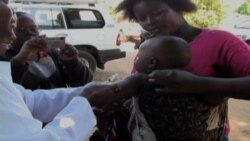Gavi, the Vaccine Alliance is seeking funds to extend its early childhood vaccine program in developing countries. Gavi's CEO says he's confident the organization's $7.5 billion goal can be reached.
Even as the organization works to increase vaccinations around the world, in the U.S., some parents are rejecting vaccines for their children. One result is a measles outbreak that started in southern California. So far, 68 people, including young children, have gotten measles.
It started in Disneyland, often portrayed as the "happiest place on earth." Since January 1 it's also been known as ground zero of a measles outbreak in the U.S. that may have far-reaching consequences.
Measles is highly contagious. It can rob a child of hearing, vision, intellect and even life. Yet a significant number of American parents - including many in California - are choosing not to vaccinate their children.
They cite concerns about side effects, including autism. But there is no link between autism and the vaccine, say specialists like Dr. Martha Rivera.
"There's no risk of autism - that was disproven.. ..all the fear factors have been taken away," she said.
Some of the world's top infectious disease experts say vaccines are not only medically effective, they are cost-effective, eliminating the financial burden of treating preventable diseases. Dr. Anthony Fauci addressed the issue in an earlier interview with VOA.
"If you had to pick out one intervention, if you balance the investment that you make in the research and the implementation and the health benefits, vaccines have to be at either the top of the list or very much on the short list," he said.
Dr. Seth Berkley agrees.
"Vaccines are among the most effective and cost-effective interventions that exist," he said.
In Somalia, vaccination programs are a cause for celebration. Since it was founded 15 years ago, Gavi estimates it has immunized more than 500 million children and, as a result, saved more than six million young lives around the world. Gavi is looking to immunize more than 300 million children in the next few years.
Meanwhile, in the U.S., experts say childhood diseases have become rare because vaccines are so effective. In this sense, vaccines are a victim of their own success.





